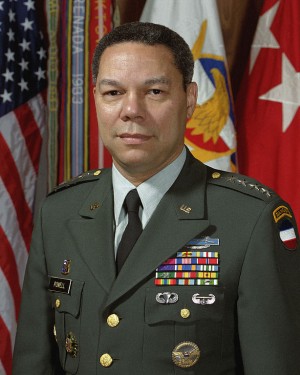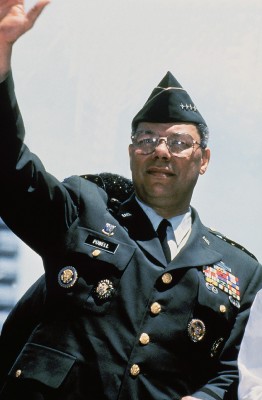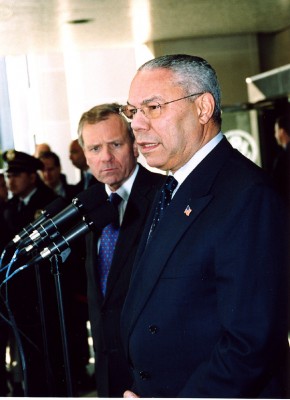| Colin Powell | |
|---|---|
| U.S. Secretary of State | |
| Years of Service | 1968-2005 |
| Born | Apr. 5, 1937 New York City, NY |
| Nationality | African-American |
| Political Parth | Republican |
Colin Powell (born April 5, 1937) was both a four-star general in the United States Army and a significant statesman. He was the first African-American to become Secretary of State and the Chairman of the Joint Chiefs of Staff. On several occasions, he was urged to run for U.S. President, but each time he declined. He has been known for his willingness to speak out against both Republican and Democratic policies that he felt were not in the country’s best interests.
Early Life and Education
Powell was born in Harlem, the son of immigrants from Jamaica who valued achievement and education. His school days in the South Bronx, however, ended without his having decided on his future career. While studying geology in New York at the City College, he signed up for the Reserve Officers Training Corps. He quickly excelled in this role and commanded the precision drill team of his unit. When he graduated in 1958, he did so at the top of his corps. By then, he was a cadet colonel, the highest corps rank.
After receiving his U.S. Army commission as a second lieutenant, in 1962 he joined 16,000 other military advisors who were being sent to South Vietnam by President John F. Kennedy. He was wounded by a booby-trap the following year and was given the Purple Heart as a result. Shortly afterward, he also received the Bronze Star. In 1968 and 1969, he served another tour of duty in the country. He also received the Soldier’s Medal, one of his 11 military honors, for rescuing comrades from a helicopter which was on fire despite being wounded himself.
While studying in Washington D.C. at George Washington University, Powell achieved an MBA. He was promoted to major and with a fellowship from the White House, he was given a post in Richard Nixon’s administration at the Office of Management and Budget. The Director of the office, Caspar Weinberger, saw Powell’s potential, as did his deputy, Frank Carlucci. Later, during Ronald Reagan’s presidency, both men would remember Powell’s abilities and would ask him to serve them again.
Further Promotion and Recognition
After his fellowship was over, the now Colonel Powell commanded a battalion in Korea and then served at the Pentagon in a staff role. He studied at the Army War College and then served in the 101st Airborne Division, where he led a brigade. He was now a brigadier general. President Carter’s time in the White House saw Powell in assistance roles at both the Energy and Defense Departments and he became a major general. During the transition to the Reagan administration, Powell worked under Carlucci.
After serving in Kansas and Colorado as assistant and deputy infantry commanders, Powell went to work back in Washington for Weinberger, who was now Secretary of Defense. His period in this role covered the bombing of Libya and the controversial Grenadian invasion. Later, he testified to a private session of Congress about the so-called Iran Contra affair. Only four other people apart from Powell had been told of the operation, although Powell himself was cleared of doing anything wrong.
Powell moved to Germany in 1986 to command the Fifth Corps in Frankfurt. However, he was soon recalled to the U.S. in order to serve as Carlucci’s deputy as National Security Advisor. In 1987, when Carlucci became Secretary of Defense, Lieutenant General Powell – as he now was – took on the National Security Advisor role. While carrying out this job, in which he was the first African-American to serve, he was responsible for both policy and technical aspects of Reagan’s summit meetings with Mikhail Gorbachev of the Soviet Union.
The First Gulf War
Under President George H. W. Bush, Powell was Chairman of the Joint Chiefs of Staff, a post which thrust him into the spotlight during Operations Desert Shield and Desert Storm. After the successful repulsion of the Iraqis from Kuwait, Powell carried on his role in the early part of Bill Clinton’s presidency. He openly disagreed with Clinton over plans to allow homosexuals to serve in the U.S. forces, although he reluctantly accepted the “don’t ask, don’t tell” compromise that was to remain in place for two decades.
This was almost Powell’s final act as an active serviceman. He then retired, although he took part in a mission to Haiti in 1994 to help bring about a return to democratic, civilian government in the country. Powell was registered as an independent voter and was always careful to avoid making his personal political opinions known, although he did openly support Lyndon Johnson in 1964. Now, however, his widespread popularity meant that he had become a favorite of many to run for President of the United States.
Powell publicly registered as a Republican voter in 1995 and gave a speech at the party’s 1996 convention. He avoided promising to stay out of party politics, but he has never actively sought office in an elected role. In 1997, he opened a Center for Policy Studies, named in his honor, at the City College where he studied many years earlier. This body had the goal of helping prepare high-caliber students from the college for public service and policy careers. Powell also spent much of the late 1990s working with America’s Promise, an organization devoted to young people.
Becoming Secretary of State
In 2001, George W. Bush asked Powell to take on the role of Secretary of State, the most influential government role ever held by an African-American up to that point. Powell became known and liked for the quality of his departmental administration and for cultivating good international relations. After the September 11 terrorist attacks in 2001, he was instrumental in building a coalition of nations willing to ally with the United States in Afghanistan and commence military operations there.
Some reports claimed that Powell was very uneasy about Bush’s intention to remove Saddam Hussein’s regime from Iraq by invading that country. However, in front of the United Nations Security Council, Powell gave evidence to the effect that Iraq was conducting a covert program of weapons development despite the U.N. resolutions. This evidence helped to win over many U.S. Congress members to the cause of military action, although Powell later faced strong discontent when the information presented in the evidence was deemed inaccurate.
Although Bush was re-elected in 2004, Powell served for only a short time before resigning from the office of Secretary of State. Thereafter, he generally stayed out of public life, although he occasionally suggested that the Iraq War was not conducted in an ideal fashion. In 2008, he pointedly declined to give his endorsement to any Republican presidential candidate. A few weeks before the election, however, he announced that he would back Barack Obama, the Democratic nominee.


